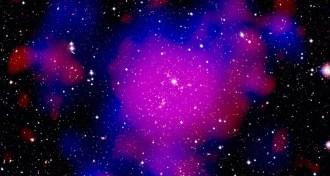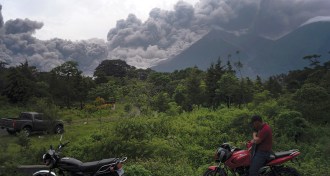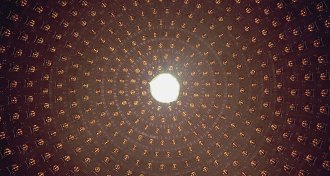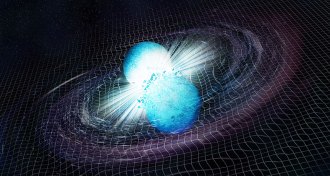Uncategorized
-
 Particle Physics
Particle PhysicsIf real, dark fusion could help demystify this physics puzzle
Fusing dark matter particles might explain why galaxy cores have evenly distributed dark matter.
-
 Environment
EnvironmentA big analysis of environmental data strengthens the case for plant-based diets
A new study calculates the bonus for the planet of choosing more foods from plants.
By Susan Milius -
 Life
LifeDogs carry a surprising variety of flu viruses
Dogs in China carry a wider variety of flu viruses than previously thought, and may be capable of passing the flu to humans.
-
 Health & Medicine
Health & MedicineWhat we know — and don’t know — about a new migraine drug
A migraine prevention drug was recently approved by the U.S. Food and Drug Administration. But some questions about the therapy remain.
-
 Earth
EarthHere’s a look at the world’s deadliest volcanoes — and the ways they kill
Scientists gathered data on nearly 280,000 global volcano deaths from 1500 to 2017 and sorted fatalities by cause of death, such as lava flows or gas.
-
 Health & Medicine
Health & Medicine‘Outbreak’ puts the life cycle of an epidemic on display
At the Smithsonian National Museum of Natural History, the exhibit “Outbreak” highlights how infectious diseases shape our world.
-
 Genetics
GeneticsWhat consumer DNA data can and can’t tell you about your risk for certain diseases
Consumers face lots of choices and unanswered questions when they get personal genomic information related to disease risk from the Internet.
-
 Health & Medicine
Health & MedicineBlame opioids for a fifth of young adult deaths in the United States
Of young adults aged 25 to 34 who died in 2016, 20 percent of those deaths were opioid-related.
-
 Particle Physics
Particle PhysicsMysterious neutrino surplus hints at the existence of new particles
Neutrinos show up in greater numbers than expected in an experiment, possibly bolstering the idea of a fourth type of the particle.
-
 Astronomy
AstronomyA neutron star crash may have spawned a black hole
The neutron collision that took the astronomical community by storm last year probably created a black hole, researchers say.
-
 Tech
TechFuture smart clothes could pack serious gadgetry
Casual daywear may someday contain some serious tech. But engineers have to take conventional electronics and make them comfortable to wear.
By Maria Temming and Mariah Quintanilla -
 Neuroscience
NeuroscienceHere’s why scientists are questioning whether ‘sonic attacks’ are real
Sonic attacks would be hard to pull off and a terrible way of incapacitating diplomats, experts say.